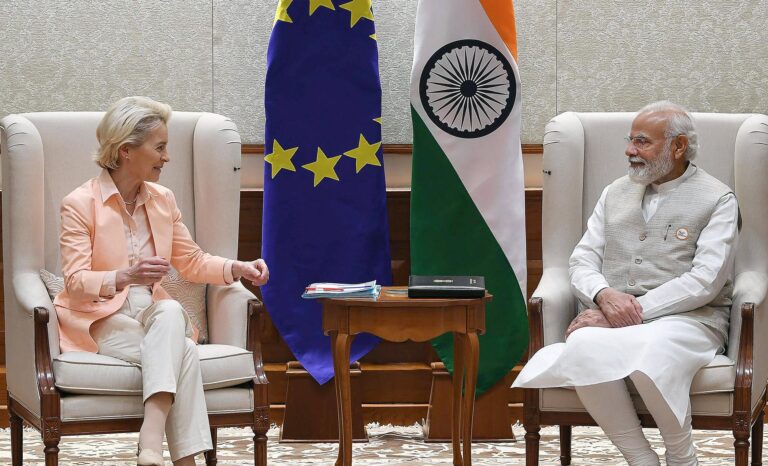The European Union is seeking to strengthen its relationship with India, despite growing concerns over Prime Minister Narendra Modi’s close ties to Russia. As geopolitical tensions continue to shape global alliances, Brussels appears determined to engage New Delhi more closely, balancing strategic interests with the complexities of Modi’s foreign policy orientation. This move highlights the EU’s intent to bolster cooperation in areas such as trade, security, and climate, even as it navigates the challenges posed by India’s longstanding relationship with Moscow.
EU Seeks Stronger Economic and Strategic Partnership with India Amid Geopolitical Tensions
The European Union is intensifying efforts to solidify its economic and strategic alliance with India, seeking to navigate the complexities presented by current global geopolitical tensions. Amid concerns over Prime Minister Narendra Modi’s perceived closeness to Russia, EU leaders emphasize that fostering collaboration with India remains a priority. This move aims to leverage India’s growing market potential and crucial geopolitical position in Asia, balancing interests without alienating other global partners.
Key areas targeted in this enhanced partnership include:
- Trade diversification to reduce dependency on other conflicting economies.
- Joint efforts on climate change and sustainable development projects.
- Collaborative defense initiatives addressing regional security challenges.
| Priority Sector | EU Objectives | India’s Role |
|---|---|---|
| Technology & Innovation | Promote digital infrastructure and AI research | Provide a large talent pool and growing startups ecosystem |
| Energy | Expand renewable energy investments | Accelerate clean energy adoption and policies |
| Defense & Security | Strengthen strategic alliances and cybersecurity | Enhance regional stability and intelligence sharing |
Bridging Differences Over Modi’s Russia Relations Critical for EU-India Cooperation
Despite ongoing international tensions surrounding India’s Prime Minister Narendra Modi’s connections with Russia, European Union officials emphasize the necessity of fostering stronger bilateral relations. They argue that the strategic importance of India as a global partner, particularly in areas like trade, technology, and climate initiatives, outweighs potential diplomatic hurdles. EU leaders are advocating for a pragmatic approach, focusing on shared interests rather than geopolitical differences, to cement a cooperative future.
Key areas of EU-India cooperation include:
- Climate change mitigation and clean energy development
- Enhancement of digital infrastructure and cybersecurity
- Promotion of sustainable trade and investment flows
- Collaboration in health and pandemic preparedness
| Sector | EU Priority | India’s Opportunity |
|---|---|---|
| Renewable Energy | Technology transfer & funding | Scaling solar capacity |
| Digital Economy | Cybersecurity frameworks | Expanding IT exports |
| Trade | Market access & standards | Diversifying partners |
| Health | Joint R&D on vaccines | Improving public health |
Experts Recommend Enhanced Dialogue and Trade Initiatives to Solidify Alliance
In an era marked by geopolitical uncertainties, experts emphasize the urgency to deepen engagement between the European Union and India, transcending prevailing diplomatic challenges. Key analysts urge the expansion of multifaceted dialogues that encompass strategic, economic, and technological dimensions. They argue that sustained communication channels would not only alleviate mistrust but also pave the way for a resilient partnership capable of withstanding external pressures.
Trade specialists highlight several actionable initiatives to strengthen bilateral commerce, including:
- Establishing joint innovation hubs focusing on green technology and digital infrastructure
- Enhancing tariff and non-tariff barrier negotiations to facilitate smoother market access
- Promoting cultural exchanges to foster mutual understanding among business communities
| Initiative | Focus Area | Expected Impact |
|---|---|---|
| Innovation Hubs | Green Tech & Digital | Accelerated tech transfer and economic growth |
| Trade Barrier Reduction | Tariffs & Regulations | Improved market access and export volumes |
| Cultural Exchange Programs | Business & Social Ties | Enhanced mutual trust and collaboration |
In Summary
As the European Union seeks to deepen its strategic partnership with India, balancing geopolitical interests with human rights concerns remains a delicate challenge. While Prime Minister Narendra Modi’s government maintains ties with Russia, the EU’s call for closer cooperation underscores a pragmatic approach aimed at countering emerging global threats and fostering economic collaboration. How this complex relationship evolves will be a key focus for policymakers on both sides in the months ahead.




